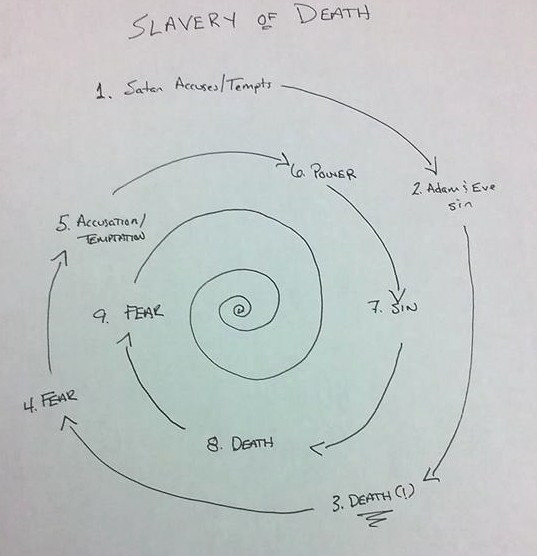This is another in a series of older posts I am porting over from an older blog space. This one is from the Fall of 2015. These thoughts continue to be foundational to the way I’ve come to look at things. Enjoy!
Over the summer, I read Richard Beck’s The Slavery of Death and John Romanides’ The Ancestral Sin. These two works have really helped nuance and deepen my understanding of how the broken world goes round — and how the work of Jesus counters that brokenness. Today, I thought I would share some of what I’ve learned.
Growing up in an evangelical context, I have always viewed humanity’s primary dilemma as sin. Working from passages like Romans 6:23 — “ … the wages of sin is death …” — I’ve carried a pretty straightforward view of how things worked. We sin and that leads to death, and so Jesus comes to somehow deal with our sin problem.
In recent years, and especially since I’ve started thinking more deeply about themes of atonement and resurrection, a second set of texts have come to my attention that complicates the simpler narrative about sin and death and Jesus on the cross. For instance, here’s a key passage in Hebrews 2:14–15:
Therefore, since the children share in flesh and blood, he also shared the same things in the same way. He did this to destroy the one who holds the power over death — the devil — by dying. He set free those who were held in slavery their entire lives by their fear of death.
Here, the Hebrews writer characterizes what Jesus did on the cross as the defeat of the devil who holds power over death. In accomplishing this victory, Jesus redeems us from our slavery to the fear of death.
While not denying sin or it’s ill effects, the writer seems to believe atonement is not so much about our sin problem as it is about our death problem. Then, there is an interesting suite of passages in 1 Corinthians 15:
Death is the last enemy to be brought to an end … (vs. 26)
Death has been swallowed up by a victory. Where is your victory, Death? Where is your sting, Death? Death’s sting is sin … (vs. 54–56)
1 Corinthians 15 is Paul’s treatment of resurrection. This is the victory he refers to in the concluding remarks of vs. 54ff. Of particular interest is that Paul describes the resurrection of Jesus in terms of the defeat of death rather than the defeat of sin. In fact, in quite the reversal from my typical way of thinking about the subject, he calls sin “death’s sting.” Here, sin is what results from death.
Again, these texts suggest a way of looking at the human predicament that is different from the way I’ve grown up looking at it. They suggest the primary dilemma is not sin, but death. Further, while it is clear sin opened the door to death, we are also left with this intriguing notion that our slavery to the fear of death also leads to sin.
This last point, in particular, has captivated me. Working from the perspective of thinkers like the Preacher of Ecclesiastes and Ernest Becker, it seems that our anxieties about death motivate an awful lot of the sinful things we do.
The Preacher points out that our search for meaning in life “under the sun” will always be futile because of death. Whatever we make of the other texts, this is clearly the issue for him. No matter what you accomplish, no matter who you become, it is all vanity because you die. That’s a heavy thought.
Becker comes in and argues (convincingly) that an awful lot of what we do in life amounts to trying to forget, deny, or push past the Preacher’s conclusion. We push back against our anxieties in thousands of subtle and not-so-subtle ways. Sometimes we even push back violently and at the expense of others.
So, sin not only leads to death, but our fear of death also leads to more sin. Round and round that goes, on and on. For me, the old way of looking at the causality of sin and death has changed. It used to be a straight line — sin leads to death. Now it has been replaced by a downward spiral that leads us deeper and deeper into slavery, with death being the primary dilemma we face. Here’s how I sketched it out earlier this week:






